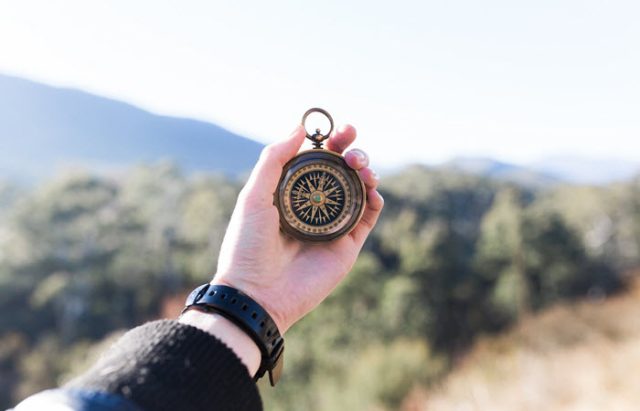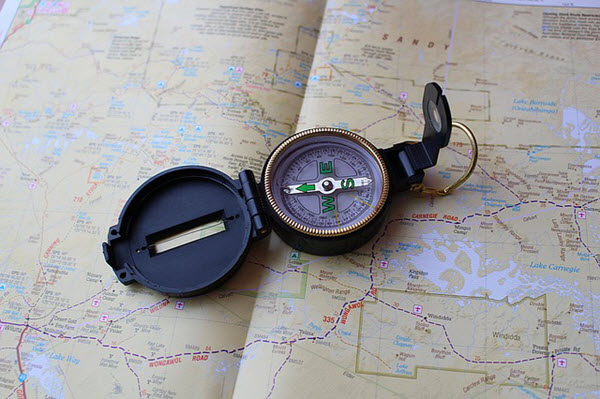Tips on Choosing the Best Compass for Hiking
By Sammy Garrard
February 24, 2017 • Fact checked by Dumb Little Man

Before you spend a lot of money on what you think is the best compass for hiking, you should take two important steps (that aren’t part of your hike). Learn all you can about compasses and how they should be used, then get a compass and work with it close to home. Once you feel confident at this level, you could be ready to take to the open trails.
With that in mind, there are a few key factors you should consider when shopping for a compass. The first idea has to do with the amount you’re planning to invest.
One old fellow who spent a lot of time hunting, fishing and just wandering outdoors said he always went one step better when buying any equipment. His reason? “It only takes a few pennies more to go first class.”
Analog or Digital

Of course, the traditionalists will almost always purchase the analog compass because that’s what they feel most comfortable with. These compasses have been around for years, because they don’t have a power source (batteries) such as the new digital models have. Analog compasses will last for years if they’re treated with the care that any fine instrument should receive. You’re never going to be without this tool because of a dead battery.
Digital compasses will do a lot of the work for you, but because they rely on batteries, you have to make sure the batteries are charged before you head out the door. You’ll also need a portable charger so you can keep the batteries charged in your vehicle. This is a completely different way of looking at compasses and you should be prepared for it.
Declination is the key to safely and accurately using a compass. You need to know which direction is true north and which direction is magnetic north. One points you toward the North Pole as it stands in geography. The other points you to the magnetic North Pole. They are not the same. Declination is the angle of difference between the two. It can, and does, change.
Be Sure
If you know you’re facing true north, your compass will point you toward magnetic north. It's an important difference you should understand when you’re in unfamiliar territory.
This won’t be quite so important with short trips and when you’re in an area with which you’re familiar. But as you head out on a long journey, far from home, you could end up missing your destination by several miles. Keep in mind that an inch off line at the start becomes a mile off line if you travel far enough.
The best compasses will help you deal with this difference, adding or subtracting from the bearing. Make this adjustment and you should be able to travel safely and accurately. This may be one of the good reasons for buying a top-of-the-line digital compass if you’re not confident with the use of the analog design.
Of course, you shouldn’t have to work very hard just to see and read your compass, so make sure you have one that you can use in low-light conditions. It’s important to have one that you can use without straining your eyes even in daylight. Consider the word “luminosity” and the word “backlighting” when you’re shopping for a good compass.
Tough Compass

You have a compass with you on a journey so that you will not get lost. That’s very simple. You want to know where you are and where you’re going. But if you don’t spend those few extra pennies (as mentioned earlier), you may find a cheap compass doesn’t hold up under difficult outdoor conditions. Buy a compass that is durable and built for real-world use.
If you hike on another part of the planet, you should give some consideration to a compass with a global needle. Compasses can be calibrated for use in certain locations, which may cause your analog needle to drag and give you inaccurate information. A global needle will help you adjust for variances in the magnetic pull depending on where you are.
You should also consider getting a compass with a good quality mirror for sighting, so you can read your compass and see the surroundings at the same time. You’ll also have a good tool for signalling if you find yourself in need of assistance during an emergency.
Some Products to Consider
To give just a few examples: Give serious consideration to Suunto compasses. The MC-2G has a sighting mirror and a global needle. It provides for adjusting declination, has great luminosity and is very accurate. The top of the line with Suunto is the Navigator MC-2. You should be able to purchase this excellent tool for about $60 to $75. When you invest in a compass of this quality, be sure to get a good case as well, for protection and convenient carrying.
You will also do very well with the Silva Ranger 515, which is about the same weight as the Suunto, has a global needle, sighting mirror, magnifying lens and excellent luminosity. It also provides declination adjustment. This one comes in at about $55, depending on your source.
You can buy a usable compass for $15 to $20 but you will sacrifice many of the most important benefits. Stay away from compasses that are no more than accessories, especially if they come on a keychain or as a wearable watch. Some of these might work in basic situations, but they will not be suitable for serious navigation.
Summary
In addition to the factors already mentioned, look for a rotating azimuth ring or bezel with small degree intervals. Look closely at the markings on the baseplate. It helps to have a rule of some sort to measure distance on a map. Look for arrows and lines on the needle housing and baseplate that can help with orientation and navigation as well.
There is a definite bottom line when you are buying a compass for serious hiking and outdoor travel. Take the old guy’s advice and spend a few extra dollars, just to be safe.
See Also: 8 camping hacks that’ll turn you into a super camper (and impress the girls)
Sammy Garrard
I'm Sammy, founder of SOutdoors.com. I am a prepper with over 15 years of experience. I'm excited to share my knowledge and the things I learn while travelling in British Columbia, Canada where he lives and around the world. Follow me: Sammy_Garrard


